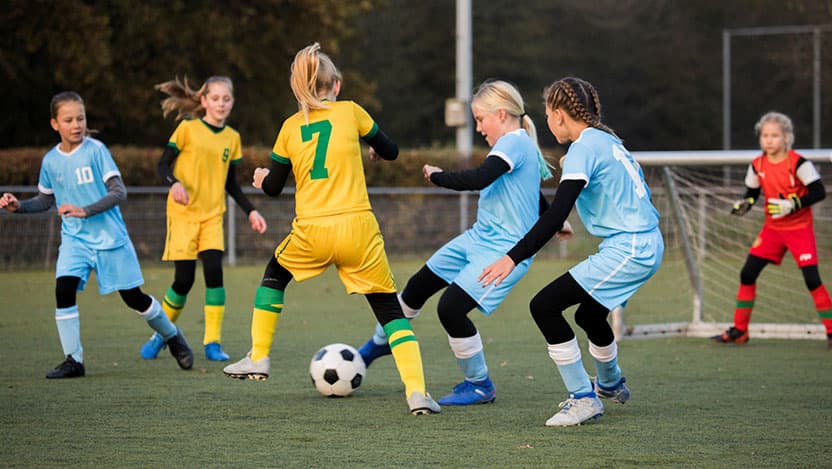How to better protect young athletes from sports injuries

While working up a sweat and building their skills, young athletes run the risk of suffering from the three H’s: head injuries (concussions), heart problems (cardiac arrest) and heat illnesses (heat stroke/illness). According to the Centers for Disease Control and Prevention, more than 2.6 million children under the age of 19 are treated in the nation’s emergency departments each year for sports- and recreation-related injuries.
The key things to know as a parent or coach are the signs and symptoms of injuries. Be aware of risk factors for injury or illness, too. As a parent or coach, you know your child better than anyone. You play a vital role in identifying and addressing symptoms of any illness or injury in its early stages.
Symptoms of the “Three H’s”
Head injuries
You don't have to lose consciousness (pass out) to have a concussion. In fact, you don't even have to hit your head. Many concussions are caused by being a "bobblehead" – having your head shaken after being hit or falling. Concussion symptoms usually follow right away. Common immediate symptoms include headaches, pressure, dizziness, feeling foggy or slowed down, ringing in the ears, being unusually emotional and having trouble concentrating or remembering.
Sometimes symptoms are very mild, or develop slowly within minutes to hours after the injury. Having eyes and ears extra-sensitive to light and sound, disorientation and abnormal balance also are signs of concussion.
The most important thing to know about concussions is that ANY TIME a parent, coach, athlete, athletic trainer or healthcare professional suspects a concussion, the athlete should sit out and not return to play until seen by a healthcare provider. Concussions are serious injuries, but if diagnosed and treated right away, almost all patients get better within a few weeks.
Heart problems
There is nothing scarier than watching an athlete collapse on a field or court. Fortunately, this rarely happens. Nevertheless, every child should see their doctor before playing sports, regardless the level of play. Most kids who collapse due to a heart problem don't have warning signs, so a pre-sports physical can save lives. Sometimes extra tests are needed, like an EKG (heartbeat tracing) or an ECHO (heart ultrasound), to check the heart further. Your doctor will know if any tests are needed.
Feeling faint or passing out during sports, feeling like your heart is racing or skipping beats, or having serious chest pain during exercise are all reasons to stop participating immediately and get checked out. A family history of cardiac death under the age of 50 in an immediate family member (parent or siblings) is the greatest risk factor for sudden cardiac death in children. See your doctor if sudden cardiac death runs in your family.
Heat illness
Heat illness represents a spectrum of heat-related medical conditions ranging from heat exhaustion and cramps to heat stroke. General signs and symptoms include feeling hot and overheated, dehydrated, lightheaded, muscle cramps and fatigue. Mild forms of heat cramps and heat illness are treated with water or carbohydrate-electrolyte solutions (Gatorade, Powerade) and rest in a cool area or shade to cool the body.
Athletes who have high temperatures, nausea, vomiting, severe headaches, confusion, clumsiness, stumbling or disorientation, or who collapse or stop sweating (even while hot) need to go to the nearest emergency room. The best prevention for heat illness is dressing in light or breathable cotton clothes, drinking lots of fluids, taking breaks while playing, finding shade when possible and not getting overheated.
Concussion prevention
Proper technique – specifically, tackling in football and rugby, and headers in soccer – can help athletes better protect themselves from head injuries. Beyond that, it’s essential for the athlete to be upfront and honest about their symptoms. If they’re not, athletes can put themselves at risk for second impact syndrome (SIS). That occurs when an athlete suffers a second head injury while recovering (with continued lingering symptoms) from their first head injury. This can cause diffuse cerebral swelling, brain herniation and even death.
Eating and hydrating for athletes
Athletes, even young children, should eat a meal two to three hours prior to exercise or physical activities. Meals should be high in carbohydrates with a moderate amount of protein. They should generally be low in fat. A carbohydrate snack like an energy bar, granola bar or fruit can be eaten 30 minutes prior to a workout. After an hour of activity, an athlete should have a carbohydrate snack or drink. Always have water available to drink, and always let an athlete drink when thirsty. Neither dehydrated nor hungry athletes perform their best. Food is fuel and provides energy for the best performance.
The three H's of sports injuries (head, heart, heat) are almost always preventable. When they occur, prompt evaluation and treatment can help athletes recover quickly and prevent complications. Every young athlete should be taught to speak up if feeling unwell or injured – and parents and coaches should listen. Most importantly, if anyone sees an athlete looking injured or ill, they need to get that athlete out and resting until checked out. Play smarter and play safer.
Holly Benjamin, MD, is a specialist in adult and pediatric sports medicine and nonsurgical musculoskeletal injuries. She serves as director of the Primary Care Sports Medicine Program at the University of Chicago Student Care Center and is a member of the medical team for the WNBA Chicago Sky.

Holly Benjamin, MD
Dr. Holly Benjamin is a specialist in sports medicine and non-surgical musculoskeletal injuries.
Read more about Dr. BenjaminPediatric Sports Medicine
At Comer Children's, our experts offer unique approaches to pediatric sports medicine for children and teens of all ages. We care for young athletes at every level, from seasonal athletes to elite competitors, with a range of orthopaedic conditions and sports-related injuries.
Learn more about our pediatric sports medicine services